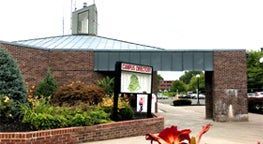Camera Monitoring
Public Safety is responsible for 400 CCTV cameras used to monitor campus and deter crime. Camera footage is also used to review incidents that occur on campus.
Emergency Telephones
There are 100 blue light telephones or call boxes at strategic locations near campus roadways, sidewalks, parking lots and residence halls.
Direct contact with Public Safety is established as soon as the button is pushed. The dispatcher immediately knows the location of the caller and can dispatch a mobile patrol to the location of the call. Even if the caller is unable to speak, an officer will still respond to the location of the call.
The emergency telephones are available for the use of students, staff, faculty, as well as to visitors to the Rensselaer campus.
Building Access Control
Public Safety manages Rensselaer's electronic building access control readers.
- Residence Halls
All major residential facilities are equipped with exterior door card access and door alarms that report to and are monitored by Public Safety. There are also cameras in residence hall entries, all rear exit doors are alarmed, and all rooms and residence halls are equipped with deadbolt locks and door peepholes. In addition, the exterior entrances of all residence halls are locked 24 hours a day, and are only accessible using an authorized personal identification card with approved building access rights. - Other Facilities Many other campus buildings, offices, academic buildings, laboratories, research facilities and computer rooms also have card access, alarms, and closed circuit television cameras. These closed facilities are also only accessible with authorized identification card with approved access rights or an authorized key.
- Normal Operating Hours Members of the campus community, as well as guests and visitors, have access to most campus buildings and facilities, Monday through Friday, at times when the Institute is normally in operation. However, limited building access hours may be in effect during weekends and/or holidays.
- Evening Hours Exterior doors on campus buildings are secured each evening by the Department of Public Safety.
Crime Statistics
The Jeanne Clery Disclosure of Campus Security Policy and Campus Crime Statistics Act (Clery Act) requires colleges and universities to disclose statistics annually both for crimes reported to local agencies and crimes reported to campus security authorities.
The Daily Crime Log includes the offense title, offense date, time, a brief description of the crime and the general location the crime occurred. The log is designed to provide timely crime information and all crimes must be logged within two business days. At times, certain information may be withheld to protect victim confidentiality, to prevent hindering an ongoing investigation, or to keep a suspect from fleeing.
Hate Crime Statistics
Rensselaer is required to disclose the occurrence of the following hate crimes when the motivation for the crime is the victim's membership or perceived membership in a particular race, gender, gender identity, religion, sexual orientation, nationality, ethnicity or disability:
- Murder/non-negligent manslaughter
- Domestic violence
- Negligent manslaughter
- Dating violence
- Forcible sex offense
- Stalking
- Non-forcible sex offense
- Larceny/theft
- Robbery
- Simple assault
- Aggravated assault
- Intimidation
- Burglary
- Destruction, damage, vandalism to property
- Motor vehicle theft
- Arson
- Any other crime involving bodily injury
Rensselaer experienced no reported hate crimes in 2020, 2021 and 2022.
Investigations Unit
Public Safety is available to respond 24/7 to investigate criminal activity.
Public Safety assists in analyzing crime reports, provides victim services, confers regularly with local, county, and state law enforcement agencies, and monitors and records criminal activity involving Rensselaer organizations (such as fraternities and sororities) that fall within its jurisdiction.
Criminal Incident Report
The criminal incident report filed will be initially investigated by an officer and then possibly forwarded for further processing. Normally, for such an investigation to be successful, our officers require some or all of the following elements: evidence, witnesses, suspects, serial numbers or identifying property markings, etc.
Report New Information
Often the victim of a crime may obtain or encounter information that might be helpful to an investigation after the crime has been reported. Such information may include new witnesses, values of property stolen, additional victims, etc. Moreover, a frequent problem in theft cases involves the victim not reporting stolen property he or she may have recovered at some later date. Such oversights may create problems if the victim later transfers the property's ownership and the item is discovered by police. If you have additional information, please call or contact the officer, or the investigator who processed the initial report.
Property Insurance
Rensselaer does not carry insurance for the theft of personal property. If some of your personal property has been stolen, we suggest that you contact your insurance agent for possible coverage via your homeowner's or automobile policies. Public Safety will provide a copy of the Incident Report to your insurance company upon their written request. You may also be eligible for an income tax deduction due to the loss of personal property.
Continued Cooperation
If a crime investigation is successful and an offender is identified and/or property recovered, we will need your continued cooperation in the case. For example, you may be required to identify the property or suspect, and it may also be necessary to impound property - for reasons of chain of evidence - until after a criminal prosecution or investigation is completed.
